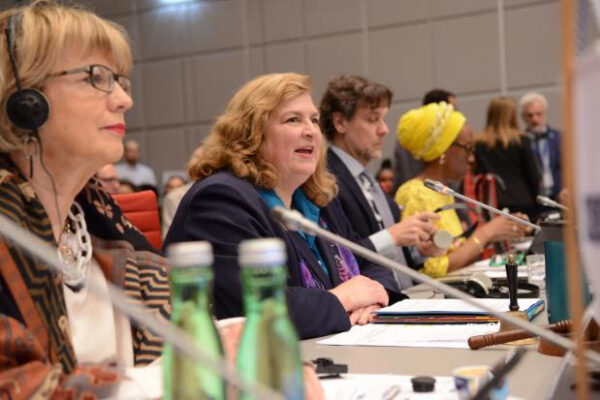OSCE leaders and anti-trafficking experts underscore need to rethink prevention methods to address evolving trafficking tactics
VIENNA, 16 April 2024 – At the 24th Conference of the Alliance against Trafficking in Persons, OSCE leaders and anti-trafficking experts called on the 57 OSCE participating States to move beyond awareness-raising campaigns, underscoring the urgent need to re-evaluate prevention efforts in the face of evolving trafficking tactics.
With participation from national authorities, international and civil society organizations, and the private sector, the annual Alliance conference is a landmark event within the global anti-trafficking community.
In his opening remarks, Chair-in-Office of the OSCE and Foreign Minister of Malta Ian Borg stated, “Malta is prioritizing combating trafficking in persons for our Chairpersonship of the OSCE this year. Addressing this significant threat to our security begins with the political will that is necessary to develop robust systems that empower the vulnerable members in our societies.” Underscoring the need for a joint effort to overcome this widespread issue, Chair-in-Office Borg added, “These challenges cannot be tackled by one participating State alone. As Chair of the OSCE, Malta remains committed to enhancing our collective OSCE efforts to effectively prevent this heinous crime.”
This year, there was a strong focus on uncovering lesser-known forms of trafficking, such as trafficking for forced criminality and the resulting blurred lines between victim and perpetrator. The need to update prevention efforts to target the vulnerabilities traffickers exploit – gender, social and economic inequalities, and inherent and circumstantial vulnerabilities – in their trafficking tactics was also explored during the conference.
“If we are to ever defeat trafficking, and this undoubtedly must be our shared ambition, effective approaches to prevention must be the bedrock upon which our anti-trafficking efforts are built,” said OSCE Secretary General Helga Maria Schmid. “Preventing trafficking in human beings from taking place is the best way to truly protect vulnerable groups and deprive traffickers of the illicit proceeds the crime generates.”
During panels and break-out sessions, participants discussed concrete ways to reshape trafficking prevention. These include bridging the gap between data and action, as well as measures that can put a stop to human trafficking in its existing forms while also preventing the emergence of new forms of trafficking. With survivor experts on each panel, the conference also underscored the importance of integrating the expertise of those with lived experience of human trafficking to improve and innovate effective prevention measures.
“Traffickers prey on the marginalized and most vulnerable. But we are witnessing an emerging trend where the demographic profile of trafficking victims is also expanding, at pace with the digital developments in which we are living,” said Dr. Kari Johnstone, OSCE Special Representative and Co-ordinator for Combating Human Trafficking. “We are witnessing an evolution of trafficking where it intersects or even merges with other crimes such as drugs, or fraud and scams where perpetrators are disguised behind victims.”
More than 800 participants from the OSCE region and beyond registered for this year’s Alliance conference, with a record-breaking 481 in-person registrations, underscoring the continued impact and relevance of the OSCE’s anti-trafficking work.
